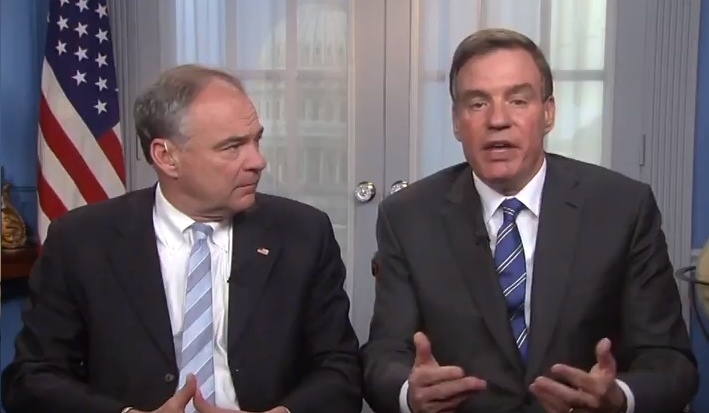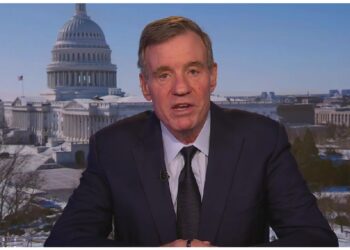From Sen. Mark Warner and Sen. Tim Kaine – great work!
WARNER & KAINE ANNOUNCE KEY VIRGINIA PRIORITIES IN SENATE DRAFT OF GOVERNMENT SPENDING LEGISLATION
WASHINGTON – Today, U.S. Sens. Mark R. Warner and Tim Kaine (D-VA) announced the inclusion of key Virginia priorities in the Senate’s Fiscal Year 2024 draft funding bills. All 12 bills were passed out of the Senate Appropriations Committee on a bipartisan basis.
“We are proud to announce that the Senate’s draft government spending legislation for Fiscal Year 2024 includes critical funding that will keep the government open, back record investments in infrastructure and U.S. competitiveness, uplift rural and underserved communities, support servicemembers and military families, provide assistance to miners suffering from black lung disease, and support key industries that are central to Virginia’s economy. We’re also proud to have secured more than $111 million for specific community projects all throughout Virginia as we work to ensure our federal budget meets Virginians’ needs. We hope that our colleagues in the House of Representatives will negotiate in good faith in order to reach a compromise on a final deal that includes funding for these important priorities,” said Sens. Warner and Kaine.
As part of the Fiscal Year 2024 appropriations process,
More information regarding specific projects in Virginia that will receive Congressionally Directed Spending is available below:
- For projects in Northern Virginia, click here.
- For projects in Central Virginia, click here.
- For projects in the Shenandoah Valley, click here.
- For projects in Southwest Virginia and Southside, click here.
- For projects in Hampton Roads, click here.
- For projects that impact communities in multiple regions across the Commonwealth click here.
The following list includes many provisions championed by Sens. Warner and Kaine on behalf of Virginia that were included in the 12 government funding bills:
Boosting Local Economies: Includes $200 million for the Appalachian Regional Commission and $20 million for the Southeast Crescent Regional Commission to support their work to build economic partnerships, create opportunity, and foster economic development.
Implementing the CHIPS and Science Act of 2022: Includes $11 billion to implement the bipartisan CHIPS and Science Act of 2022, championed by Sens. Warner and Kaine. Funding will allow the U.S. to keep pace with China and other competitors in scientific fields that can power the economy, such as artificial intelligence, quantum computing, microelectronics, clean energy, and advanced communications. Sen. Warner first introduced the Creating Helpful Incentives to Produce Semiconductors (CHIPS) for America Act in June 2020 along with Sen. John Cornyn (R-TX).
Implementing the Infrastructure Investment and Jobs Act (IIJA): Provides full funding for numerous transportation programs authorized in the IIJA, including $29.5 billion for the National Highway Performance Program, $3.1 billion for the Highway Safety Improvement Program, $245 million for the Rail-Highway Grade Crossings Program, $14.3 billion for the Surface Transportation Block Grant Program, and $2.4 billion for the Bridge Investment Program. Sen. Warner was a lead author and negotiator of the IIJA.
Strengthening Transportation and Recreation Infrastructure: Provides $150 million for the Washington Metropolitan Area Transit Authority (WMATA) and $45 million for the Active Transportation Infrastructure Investment Program, which supports multi-purpose trails.
Making Our Communities Safer: Provides $732 million – a $32 million increase from Fiscal Year 2023 – for Violence Against Women Prevention and Prosecution programs to prevent violence and better support survivors. This legislation also includes over $534 million for Community Oriented Policing Services to support state and local law enforcement and communities in developing comprehensive, evidence-based violence intervention and prevention programs based on partnerships between community residents, law enforcement, local government agencies, and other community stakeholders. This includes efforts to address gang and gun violence and improve school safety.
Support for Missing Persons Program: Includes $1 million to help with the nationwide implementation of the Ashanti Alert system. In 2018, Sen. Warner secured unanimous Senate passage of the Ashanti Alert Act, legislation that created a new federal alert system for missing or endangered adults between the ages of 18-64. The bill was signed into law on December 31, 2018.
Investing in Children: Provides $8.7 billion for the Child Care and Development Block Grant (CCDBG), which provides financial assistance to help low-income families access child care. This is $700 million more than Fiscal Year 2023. The bill also includes $12.3 billion, $300 million more than Fiscal Year 2023, for Head Start, the national school readiness program. In July, Sens. Warner and Kaine urged the White House to provide additional funding to help stabilize the child care industry. In April, Sen. Kaine introduced the Child Care for Working Families Act, legislation that would help ensure families can find and afford child care by expanding access to more high-quality options, stabilizing the child care sector, and helping ensure child care workers taking care of our nation’s kids are paid livable wages. The bill also includes $15 million for the Infant and Early Childhood Mental Health program – a program that Sen. Kaine reauthorized via bipartisan legislation.
Making Higher Education More Affordable: Provides a $250 boost to the maximum Pell Grant in the 2024-2025 school year, raising the maximum award to $7,645. The bill also includes over $1 billion, an increase of $5 million, for programs to strengthen Historically Black Colleges and Universities and other minority-serving institutions.
Supporting K-12 Education: Provides over $18.5 billion for Title I-A grants, which supports school districts with low-income students. This is $175 million more from Fiscal Year 2023. The bill also provides over $5 billion for the primary Individuals with Disabilities Education Act (IDEA) Special Education State grant program, an increase of $175 million from Fiscal Year 2023. In July, Sen. Kaine reintroduced the IDEA Full Funding Act, legislation that would ensure Congress fulfills its commitment to fully fund IDEA through regular, mandatory increases in spending.
Investing in Affordable Housing: Includes $1.5 billion for the HOME Investment Partnerships Program, which provides funding to state and local governments for housing construction, and $3.3 billion in Community Development Block Grants (CDBG), which can be used to support affordable housing, community development, and economic development. Also includes $3.9 billion for Homeless Assistance Grants (HAG), to help families and individuals experiencing or at risk of homelessness. Sens. Warner and Kaine are strong advocates for affordable housing funding each year.
Supporting Nutrition Programs: The bill includes $6.3 billion – a $615 million increase from Fiscal Year 2023 – for the Special Supplemental Nutrition Program for Women, Infants, and Children (WIC) to ensure over 6 million women, infants, and children can access adequate nutrition. It also fully funds the Supplemental Nutrition Assistance Program (SNAP) to serve an estimated 42 million people per month – with no new restrictions on eligibility – and fully funds the Child Nutrition Programs to help serve an estimated 5 billion lunches and 2.6 billion breakfasts to kids across the country.
Fighting Global Hunger: Provides $1.8 billion for the Food for Peace program and $248.3 million for the McGovern-Dole Food for Education program, while the State and Foreign Operations bill provides a $691 million increase in funding for humanitarian assistance programs, including increased investments in addressing global hunger and enhancing food security.
Preventing and Treating Substance Use: Provides $5 billion – an increase of $125 million over Fiscal Year 2023 – for opioid treatment and prevention. This includes $40 million for the Substance Use Prevention, Treatment, and Recovery Services Block Grant; $20 million for the State Opioid Response grants; $10 million for the Rural Communities Opioid Response Program; and $20 million for NIH opioid research programs.
Fighting the Flow of Fentanyl: Includes $719 million to improve the detection and seizure of fentanyl and other narcotics at ports of entry with new technology and personnel. Invests $105 million in new resources to disrupt transnational criminal organizations and stop fentanyl and illicit drugs at their source. Sens. Warner and Kaine are both cosponsors of the Fentanyl Eradication and Narcotics Deterrence (FEND) Off Fentanyl Act, a sanctions and anti-money laundering bill targeting the illicit fentanyl supply chain. Earlier this year, Sens. Kaine and Joni Ernst (R-IA) led bipartisan legislation to direct increased federal attention to fentanyl trafficking by utilizing the tools of the Department of Defense and involving Mexico as an active partner to combat the fentanyl crisis. That legislation was included in the Senate-passed National Defense Authorization Act.
Addressing Long COVID Needs: Includes $10 million for the Agency for Healthcare Research and Quality (AHRQ) to support access to comprehensive, coordinated, and person-centered care, particularly for underserved, rural, vulnerable, or minority populations that are disproportionately impacted by the effects of Long COVID. Also includes $5 million for the Health Resources and Services Administration (HRSA) to establish a network of Long COVID Centers of Excellence that can gather, develop and disseminate data regarding evidence-based treatment; educate and train providers on best practices; conduct outreach to affected populations and community organizations; and coordinate access to care. Sen. Kaine has been a strong advocate for helping individuals with Long COVID, including by leading the bipartisan Long COVID Support Act with Sen. Todd Young (R-IN).
Supporting Rural Health: Includes a $12 million increase for Rural Health programs. This includes a $10 million increase in the Rural Communities Opioid Response Program and a $2 million increase for the Rural Health Outreach program, which supports projects that demonstrate new and innovative modes of outreach in rural areas. Also includes $5 million to the Centers for Disease Control and Prevention to establish an Office of Rural Health. Sen. Kaine supported the establishment of this office as a cosponsor of the Rural Health Equity Act, and led a letter to the Senate Appropriations Committee in FY23 requesting this funding.
Addressing the Maternal Mortality Crisis: Includes an increase of $10 million for the Implementing a Maternal health and Pregnancy Outcomes Vision for Everyone (IMPROVE) Initiative to combat alarming rates of maternal mortality, as well as an increase of $2.5 million for programs to improve health outcomes during and after pregnancy and reduce disparities in maternal and infant health outcomes. Also includes $110.5 million for the Centers for Disease Control and Preventions Safe Motherhood and Infant Health programs, which is a $2,500,000 increase from fiscal year 2023 and more than $1.7 billion for the Eunice Kennedy Shriver National Institute of Child Health and Human Development, which is a $10,000,000 increase from fiscal year 2023. Sen. Kaine led a bipartisan letter to the Appropriations Committee asking for robust funding for these programs.
Pandemic Preparedness: Includes $3.67 billion for the Administration for Strategic Preparedness and Response (ASPR). This includes a $20 million increase for the Biomedical Advanced Research and Development Authority (BARDA) to support the advanced development of vaccines, therapeutics, diagnostics and devices for potential serious public health threats, and $75 million to establish a new program in manufacturing and production to ensure that critical resources including medical countermeasures and ancillary supplies are manufactured in the United States.
Increasing Funding for Pediatric Research: Provides $12.6 million to further fund the Gabriella Miller Kids First Research Act—legislation championed by Sens. Warner and Kaine and named after a child from Loudoun County who died from a brain tumor in 2013.
Supporting the Refugee Resettlement Program: Includes $133 million for refugee settlement to meet the goal of 125,000 refugee admissions for Fiscal Year 2024.
Expanding Home Energy Assistance: Includes $4.075 billion – an increase of $75 million from Fiscal Year 2023 – for the Low Income Home Energy Assistance Program (LIHEAP), which provides assistance to low-income households to help heat or cool their homes. Sens. Warner and Kaine have been strong advocates for lowering energy costs and have consistently advocated for robust funding for LIHEAP.
Expanding High-Speed Internet Access: Includes $98 million for the USDA’s ReConnect Program to expand access to high-speed broadband to remote underserved areas. Sens. Warner and Kaine have been vocal advocates for expanding broadband. As Governors and Senators, Sens. Warner and Kaine have long supported expanding broadband access in Virginia. During the pandemic, they secured significant funding for broadband through the Coronavirus Aid, Relief, and Economic Security (CARES) Act. Sens. Warner and Kaine also joined a bipartisan letter to Senate leadership requesting this funding earlier this year, and Sen. Warner personally secured billions of dollars for broadband expansion in both the American Rescue Plan and the Infrastructure Investment and Jobs Act.
Increasing Military Pay and Compensation: Fully funds the 5.2 percent pay raise for servicemembers, while providing $29.6 billion for housing and $8.4 billion for subsistence – including BAH (Basic Allowance for Housing) and BAS (Basic Allowance for Subsistence—food for servicemembers not living in government quarters).
Economic Support for Underserved Communities: Provides $341 million for the U.S. Department of the Treasury Community Development Financial Institution (CDFI) Fund. Sens. Warner and Kaine requested this funding. Sen. Warner has led efforts in Congress to support CDFIs through legislation including the Jobs and Neighborhood Investment Act and the creation of the bipartisan Senate Community Development Finance Caucus.
Small Businesses: Provides $1.2 billion to the Small Business Administration to help small businesses thrive. This funding will support SBA’s lending programs, which increase access to capital for small businesses, as well as their entrepreneurial development programs, which include services that help entrepreneurs start and grow their businesses, such as the Small Business Development Center and Women’s Business Centers networks.
Addressing Internal Revenue Service (IRS) Delays and Customer Service Issues: Includes $12.3 billion for the IRS, which will enable it to continue to update ancient computer systems, improve customer service, and reduce wait times for refunds and other services. Sens. Warner and Kaine have consistently pushed the IRS to address poor customer service and severe delays within the department.
Support for Miners: Includes $12.19 million for Black Lung Clinics. Sens. Warner and Kaine have actively worked to secure benefits for miners and their families suffering from black lung disease. In July, Sens. Warner and Kaine reintroduced the Relief for Survivors of Miners Act, which would ease restrictions to make it easier for miners’ survivors to successfully claim benefits. In June, the Senators also urged the Biden Administration to issue new silica standards to protect miners across America – a push that helped contribute towards the release of those standards.
Restoring the Chesapeake Bay: Includes $93 million for the Environmental Protection Agency’s (EPA) Chesapeake Bay Program, the primary federal program that coordinates Chesapeake Bay restoration and protection efforts throughout the Bay watershed.
Strengthening Our Ports: Provides $1.2 billion for the Maritime Administration (MARAD), including $213 million for the Port Infrastructure Development Program (PIDP), which supports the buildout and modernization of our nation’s ports including the Port of Virginia.
Advancing Scientific Discovery: Includes $8.43 billion – an increase of $330 million from Fiscal Year 2023 – for the Department of Energy’s (DOE) Office of Science. DOE’s Office of Science sponsors basic research in the physical sciences and supports 22,000 researchers at 17 national laboratories across the country, including Jefferson Lab in Newport News, Virginia.
Protecting our Courts: Provides $11.4 million to improve security of the Walter E. Hoffman Courthouse in Norfolk, Virginia. Sen. Kaine visited the Hoffman Courthouse in 2020 to observe the serious security vulnerabilities firsthand and the Senators have been fighting to enhance its security ever since. The Senators last wrote to the U.S. General Services Administration (GSA) in January 2023 to push for the long delayed security measures.


















